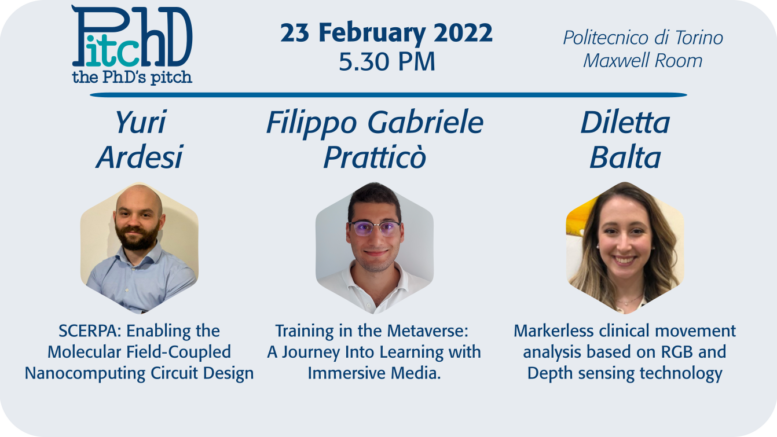23 February 2022 – 5.30 PM
Politecnico di Torino – Maxwell Room
Here’s the 2nd PitchD – the PhD’s pitch. Our PhD IEEE Student Members explain to students, colleagues and professors their research in-presence. Please register HERE.
SCERPA: Enabling the Molecular Field-Coupled Nanocomputing Circuit Design
Mr. Yuri Ardesi
Dept. of Electronics and Telecommunications (DET) – Dept. of Applied Sciences and Technology (DISAT), Politecnico di Torino
Among the technologies proposed for the beyond-CMOS scenario, the molecular Field-Coupled Nanocomputing (FCN) promises very high device density and possible high-speed operations at room temperature. The binary information is encoded in the charge distribution of molecules and propagated through intermolecular electrostatic interactions. No current transport participates in the information propagation, significantly reducing power dissipation. In this scenario, ab initio tools are essential for evaluating the fundamental properties of molecules. Nevertheless, the calculation on a single molecule requires several CPU hours, making it unfeasible for simulating and designing digital devices with thousands of molecules. The SCERPA tool, presented in this talk, is a novel algorithm that considers molecules as digital devices, with input and output, whose transcharacteristics are characterized with ab initio calculation. SCERPA evaluates the propagation and the elaboration of the information in molecular circuits with a minimal computational cost, permitting the analysis, simulation, and design of molecular FCN architectures.
Training in the Metaverse: A Journey Into Learning with Immersive Media
Mr. Filippo Gabriele Pratticò
Dept. of Control and Computer Engineering (DAUIN), Politecnico di Torino
Since the first developments, for both the main media in the eXtended Reality (XR) family, i.e., Augmented Reality (AR) and Virtual Reality (VR), training represented the application attracting most of the interest. This statement is even more true nowadays that XR Training Systems (XRTSs) are moving from laboratory settings to the industry, being more and more frequently integrated into the companies’ training programs. Although the efficacy of XRTSs as a fancy alternative to traditional learning material used by trainers in their lectures has already been proved, their effectiveness especially in the form of self-learning tools not requiring human instructors interventions is still controversial. During this speech, will be discussed the findings of research carried out to validate design guidelines and tools to devise effectively such learning experiences, both from trainees’ and trainers’ perspectives. Will be also given a sneak peek into novel pedagogical models and opportunities that this kind of media are enabling.
Markerless clinical movement analysis based on RGB and Depth sensing technology
Ms. Diletta Balta
Dept. of Electronics and Telecommunications (DET), Politecnico di Torino
Instrumented movement analysis is central for evaluating the level of mobility in populations with and without motor impairments. Recently, video-based marker less systems have been presented as a promising alternative to marker-based systems, considered the gold standard for instrumented human movement analysis, due to their affordability and the simple setup of the subject under analysis. For selected clinical applications, the output of marker less methods may be sufficiently accurate, making the use of marker-based systems unnecessary. In the field of marker less systems, RGB-D technology has been presented as a promising tool for a new generation of low-cost movement analysis systems. This talk will present a clinical marker less gait analysis protocol using a single RGB-D camera to estimate the lower limb joint kinematics for follow-up and early diagnoses purposes.


